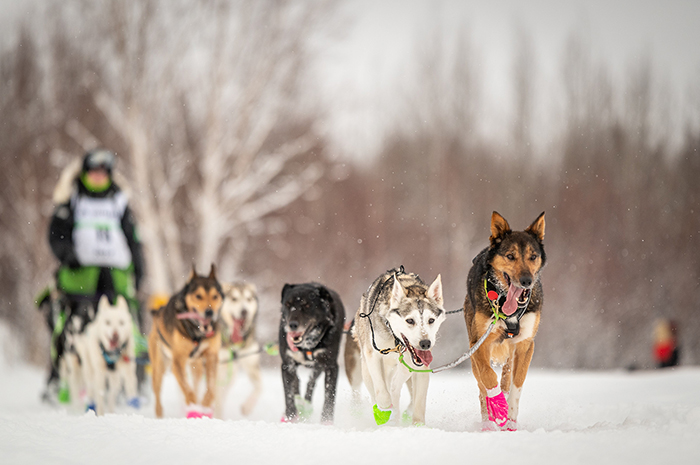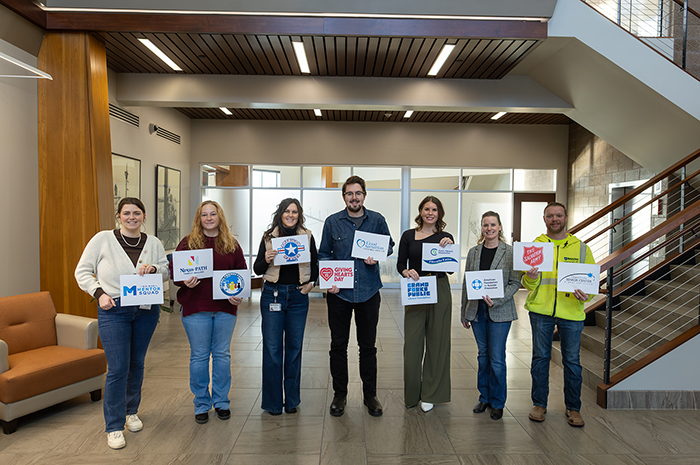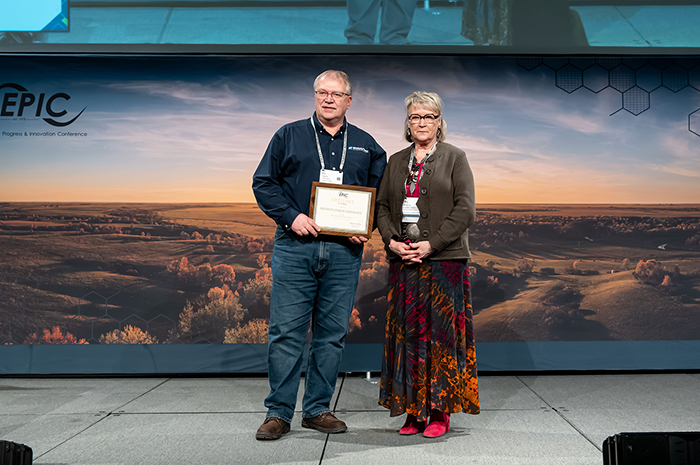The business of caring
Co-op member companies altered operations and gave generously to fulfill the region’s pandemic needs.
Many families, businesses and schools in Minnkota’s service territory faced incredible struggle in the wake of stay-at-home orders and general COVID-19 uncertainty. Through the challenges, several companies dug deep to help meet the extra needs of those who were affected the most – health care systems, vulnerable populations, essential workers and students. It sometimes took a shift in operations and a shift in mindset. Minnkota is grateful for the generosity and inventiveness of the following municipal and member-cooperative businesses and all the others who have given their all as so much is taken from their communities.

Digi-Key – Thief River Falls Municipal Utilities

Early on in the coronavirus outbreak, the leaders at Digi-Key in Thief River Falls recognized there was a rapidly growing need for the parts used in lifesaving applications. The electronics component distribution company went into response mode. It began to protect inventory for health care, safety and other critical functions and shifted its engineering resources to focus on those areas.
Among Digi-Key’s reprioritized projects was a partnership with the University of Minnesota to develop and supply additional ventilators for COVID-19 patients during the global shortage. The university has made the collaborative project – the Coventor ventilator – open source. That means other manufacturers can create their own ventilator versions using the Coventor schematics.

“The partnership with the University of Minnesota has been amazing and we’re honored to partner with them,” said Shane Zutz, vice president of human resources at Digi-Key. “It truly was a talented group of individuals pulling together to make a device that can help so many people in such a short amount of time.”
In addition, Digi-Key promptly supplied components to customers who were manufacturing parts for ventilators and other devices critical to the coronavirus fight, such as thermometers, motion-activated hand sanitizing stations and the equipment needed for employees to work remotely.
“We’ve received dozens of emails and letters from these customers thanking the Digi-Key team for sending the vital components they need in record time,” Zutz said.
Another Digi-Key innovation that rose from the crisis was a new ultraviolet (UV) sanitation tunnel used to disinfect the nearly 8,000 totes that move product around the company’s Thief River Falls warehouse. The invention goes beyond keeping Digi-Key employees safe – the design will be shared with other global components distributors.

“Digi-Key is the embodiment of the spirit and values of our community and entire region,” Zutz said. “We don’t retreat when faced with challenges, but rise to the occasion and bring everyone together to be part of the solution.”
Far North Spirits – PKM Electric Cooperative

Typically known as a northern Minnesota distiller of quality whiskey, vodka and gin, Hallock’s Far North Spirits realized its production model put the business in perfect position to make a difference during the COVID-19 crisis.
“Before this pandemic started, whenever we would give tours, we would talk about how high-proof alcohol is a hand sanitizer. It kills everything,” said Far North Spirits owner Cheri Reese.
Once Minnesota started closing bars and restaurants to the public, Reese began connecting with her distillery colleagues throughout the state. They developed a plan to convert operations to produce hand sanitizer for hospitals, grocery stores and other essential services.
“We learned early on that the only way to get high-proof denatured ethyl alcohol was to get it by the tanker truck-full, because the demand was so high. So we partnered with a group of Twin Cities distilleries so that we could buy a tote at a time of this denatured alcohol from them, and then get the glycerin and the hydrogen peroxide to start making it,” Reese explained.

In the first two weeks of April, Far North had already produced 650 gallons of hand sanitizer. The product distributed to Kittson County’s essential services was entirely donated, meeting the needs of EMT services, hospitals, grocery stores, social services and the courthouse. Outside of Kittson County, the distillery received orders from the Border Patrol, the City of Thief River Falls, the Pembina County Courthouse and more. Reese said orders have gone out as far as Detroit Lakes, Bemidji and the middle of North Dakota.
“North of Alexandria and west of Bemidji, there are no distilleries. So we’re filling that need for that half of the state of Minnesota,” she said. “Everybody is so appreciative. Everyone who calls says, ‘We can’t find this – can you help us?’ We’re thrilled that we can do this quickly.”
Far North collaborated with C&M Ford for assistance with delivering hand sanitizer to more remote towns like Karlstad, Warren and Roseau. Reese said the partnership was incredibly helpful in minimizing person-to-person contact.
The distillery is still producing spirits and filling orders for alcohol, but hand sanitizer has become a major part of the staff ’s day-to-day.
“We’ve always been very much invested in this community,” Reese said. “Being able to do something that was really meaningful and helpful at this time – there was just no question. It’s just what you do.”
Anderson Fabrics – Beltrami Electric Cooperative

For 40 years, Anderson Fabrics of Blackduck, Minn., has been known for its high-quality, upscale designs for window treatments, bedding and other home accessories. But when COVID-19 entered the national conversation, the company began researching how it could shift gears and stitch up some personal protective equipment (PPE) shortfalls.
“When we first started, we actually started asking out in the community – the hospitals, the clinics, anybody out there – what products we should be trying to make and what should we be focusing on,” said Jennifer Morrison, sales and marketing director for Anderson Fabrics.
Health care providers sent Anderson Fabrics samples of fabric masks, isolation gowns, scrubs, booties and caps, and the team went to work reverse engineering the products to see what could be made most efficiently and cost-effectively at their plant. They determined fabric masks would be the best way to both help the health care system and keep their employees actively working as typical custom orders slowed.

Anderson Fabrics now manufactures three types of fabric masks, all of which are filling the PPE need for hospitals, essential industries and individuals around Minnesota and North Dakota – including 1,400 produced for the employees of Minnkota Power Cooperative. Anderson Fabrics has even shipped masks to families as far as Spain.
“We thought we’d make a couple thousand, maybe up to 10,000 by the time it’s all done. But we’ve made at least 70,000 masks so far [over six weeks],” Morrison said. “It hasn’t really slowed down. Now we’re happy to keep on doing it and we’ve been doing a good job keeping up with it.”
The company realized that quality face coverings could be expensive or hard to find if families don’t have a seamstress in the household. They wanted to make sure that everyone who needed PPE could get it, so they made their fabric masks available on the Anderson Fabrics website.

“We’re able to take our skills and our talent and use it for something that can help the broader community. We have a ton of sewers and sewing machines, so we have the capability,” Morrison said. “Our team has done a great job. The whole place has just pitched in. It gives us a purpose in these scary times.”
Polaris – Roseau Electric Cooperative

When schools began to close their doors in Polaris’ home communities in Minnesota, Wisconsin and Iowa, the powersports manufacturer knew exactly where they could make an impact. Polaris was founded in Roseau and has been a town cornerstone for decades, and many of the employees’ children are in the school system.
“These are unprecedented times with families working to juggle online schooling amidst a myriad of responsibilities as COVID-19 has rearranged all our lives,” said Lucy Clark Dougherty, president of the Polaris Foundation. “Polaris is so pleased to donate technology that assists in enabling online learning for families within the communities we operate.”
The company donated nearly $100,000 in technology between the Roseau and Greenbush Middle River School Districts, including 150 iPads, 155 Chromebooks, cases, chargers and mobile hotspots. Polaris made similar donations to schools in Spirit Lake, Iowa, and Osceola, Wisconsin.
Larry Guggisberg, superintendent of Greenbush Middle River School District, said the donation was a “game changer.”
“I can't express how grateful our school, kids and parents are for Polaris' kindness,” Guggisberg said. “With the technology grant from Polaris, all students in the Greenbush Middle River School are able to actively participate in quality distance education programming.”
Superintendent Thomas A. Jerome echoed the gratitude. “Thank you to Polaris Industries for the incredible donation to the Roseau School District of iPads and covers, as well as hotspots, for families lacking access to broadband. Thanks to Polaris, all – not most – Roseau School District students and families have equal access to distance education,” he said.

In addition to the technology donation, Polaris donated nearly 1,300 pairs of sports goggles to support Goggles for Docs, an organization that provides protective eyewear to health care workers fighting the COVID-19 pandemic. The goggles were distributed to facilities across the nation. As of May 1, Goggles for Docs had received more than 40,000 goggle donations from outdoor enthusiasts, businesses and manufacturers. Learn more about the grassroots effort at GogglesforDocs.com.
Main image: An Anderson Fabrics employee sews one of the thousands of masks produced for essential workers, businesses and families around the region. (Anderson Fabrics)
...



